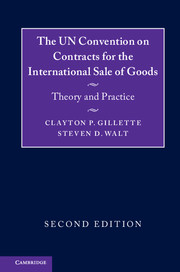Book contents
- Frontmatter
- Contents
- Preface
- 1 The CISG: history, methodology, and construction
- 2 The scope of the CISG
- 3 Contract formation
- 4 Implied terms and interpretation
- 5 Performance
- 6 Liability for nonconformity
- 7 Risk of loss
- 8 Exemption from performance
- 9 Remedies
- Appendix 1 The United Nations Convention on Contracts for the International Sale of Goods
- Appendix 2 CISG status table
- Table of cases
- Subject matter index
2 - The scope of the CISG
Published online by Cambridge University Press: 05 June 2016
- Frontmatter
- Contents
- Preface
- 1 The CISG: history, methodology, and construction
- 2 The scope of the CISG
- 3 Contract formation
- 4 Implied terms and interpretation
- 5 Performance
- 6 Liability for nonconformity
- 7 Risk of loss
- 8 Exemption from performance
- 9 Remedies
- Appendix 1 The United Nations Convention on Contracts for the International Sale of Goods
- Appendix 2 CISG status table
- Table of cases
- Subject matter index
Summary
INTRODUCTION
The globalization of trade in goods creates a problem for parties to an international sales contract. Aspects of the contract potentially are subject to the law of more than one jurisdiction, and different applicable laws can give the parties different rights under the contract. Parties typically prefer to know in advance which jurisdiction's law governs. Although they might provide in their contract for the applicable law, doing so sometimes is not cost-effective. For one thing, the benefit of selecting law depends on the law that is applicable in the absence of a contractual choice. Selecting law also can involve costly negotiations. Even if cost-effective, the parties have no assurance that their choice of law will be honored should a dispute over the contract later arise. For all these reasons, contracting parties usually like to know the law applicable to the contract when the contract does not select it.
The conflict of laws rules adopted by most jurisdictions provide contracting parties only limited help. Because these rules are vague, contracting parties cannot predict with confidence the results of their application. This is true both of American and European conflicts rules, as well as the rules in force elsewhere. More important, conflicts rules are rules of the forum (whether judicial or arbitral) and therefore can vary among fora. The majority of United States jurisdictions adopt the rule of Section 188 of the Restatement (Second) of Conflict of Laws. Under that Section, the law applicable to a contract is the law of the jurisdiction that has the “most significant relationship” to the transaction and the parties. The contacts that the paragraph identifies as relevant to determine that relationship include the place of contracting, negotiation and performance, as well as the place of residence of the parties. These non-exhaustive contacts, which can identify different jurisdictions, make it difficult to predict in advance the law applicable to the issue. The conflicts rule of the Uniform Commercial Code (“UCC”) is similarly vague. Section 1–301(b) makes the UCC as adopted by the forum state applicable to a transaction when it bears an “appropriate relation” to the forum state.
European conflicts rules are not much better. Under Article 4(1)(a) of the 2008 EU Regulation on the Law Applicable to Contractual Obligations, the law of the seller's habitual residence governs contracts for the sale of goods.
- Type
- Chapter
- Information
- The UN Convention on Contracts for the International Sale of GoodsTheory and Practice, pp. 24 - 82Publisher: Cambridge University PressPrint publication year: 2016



